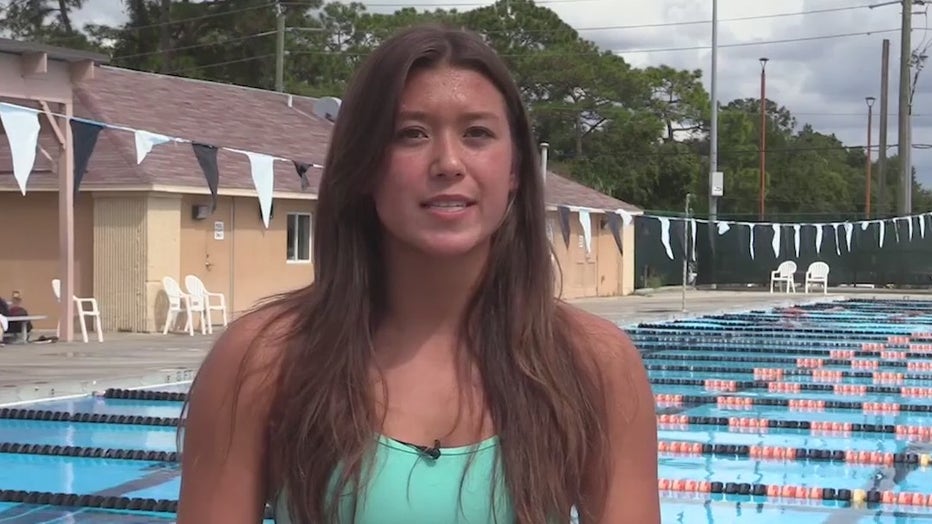Seminole H.S. swimmer battles long-haul coronavirus symptoms

Seminole H.S. swimmer battles long-haul coronavirus symptom
Elin Brudde, a senior swimmer at Seminole High School, battled COVID-19. After COVID, she’s facing new struggles.
SEMINOLE COUNTY, Fla. - Swimming used to come easy for Seminole High School senior Elin Brugge.
After COVID, she’s facing new struggles.
"I can’t hold my breath as much as I used to be able to when we’re doing, like racing and sprints," Brugge said.
Brugge believes she contracted COVID from a classmate in late August.
Even though she was fully vaccinated, the virus still got the best of her.
"There were three days where I wasn’t able to breathe. I had really low blood oxygen and I was sneezing a lot. I had a lot of sinus symptoms, like headaches and dizziness as well," Brugge said.

Elin Brudde, a senior swimmer at Seminole High School, battled COVID-19.
Brugge is back practicing and competing with her teammates, but taking things a little slower.
"Now, I have asthma symptoms. I have an inhaler. I struggle to get up the stairs at school. It’s definitely something to be taken seriously, Brugge said.
The Seminole swimmer isn’t alone. Many elite athletes are dealing with the long-term effects of COVID.
Boston Celtics forward Jayson Tatum told reporters last season that he used an inhaler before every game after recovering from the coronavirus, something he never needed to do before.
In the NFL, Buffalo Bills tight end Tommy Sweeney was forced to miss the remainder of the 2020 season after being diagnosed with post-COVID myocarditis in November.
Myocarditis is the inflammation of the heart, usually caused by a virus.
"To our best knowledge and theory is, it’s an ongoing slight, inflammatory process that continues and it can go, we don’t know how long because this is all new to us," AdventHealth Pediatrics Cardiologist Dr. Bhavya Trivedi said.
A severe case can weaken the muscle and can prevent athletes from performing at their highest level. It can even cause sudden death.
Dr. Trivedi tells FOX 35 he’s seen an increase in pediatrics patients with myocarditis.
"Though that number may still be less than 1%, it’s still a lot more than for example not getting COVID," Dr. Trivedi said.
Last year, nearly 1,600 student-athletes from the Big Ten Conference were tested for heart abnormalities following their COVID diagnosis.
The study found 37 athletes, mostly men, had some form of myocarditis.
That’s why athletic trainers at Seminole High School modified their "return to play" protocols. Trainees monitor things like breathing, chest pains and exhaustion.
"As there’s been more data on potential secondary effects post-COVID, specifically myocarditis, we are going to continue to monitor athletes differently," Seminole High School Associate Athletic Trainer Lauren Surratt said.
Contracting COVID changes Elin Brugge’s life. She says she urges other young people to take the virus seriously.
"I do find it surprising that it’s affecting athletes since we’re supposed to have healthy hearts and stuff like that. It’s kind of scary," Brugge said.

